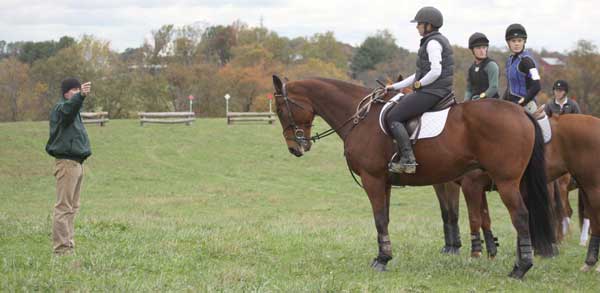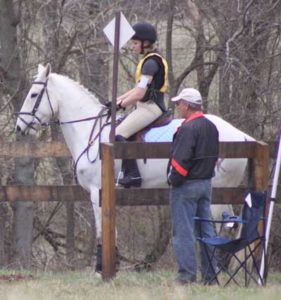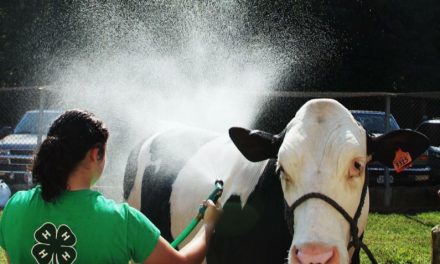By Katherine O. Rizzo
(first appeared in the April 2016 issue of The Equiery)
At the start of the 2015 eventing season, the U.S. Eventing Association Membership Committee, in response to the decline in members at the lowest levels of the sport, proposed a new division called Assistance Allowed in which competitors would be allowed coaching during the competition phases of a horse trial. The — USEA Board of Governors passed the proposal in August and an official press release about the division was published on November 9, 2015.
According to this press release, the proposal was made to bring “riders at the grassroots level into the membership.” The press release went on to state, “The grassroots level includes those riders who need a little extra support prior to competing in recognized events because they are either inexperienced or have been disheartened due to encountering difficulty on a Beginner Novice cross-country course.”

The “Assistance Allowed” division falls under the category of “Eventing Tests,” which also includes competition formats such as Classic Three-Days and Combined Tests. ©Katherine O. Rizzo
The Membership Committee then conducted an open forum to discuss the new division at the — USEA Annual Meeting, held in Washington, DC this past December. The response was a mix of those in favor of the division and those against. But in the end, the division is now being offered for the 2016 season through the “Eventing Tests” portion of the — USEF Rules for Eventing.
Sharon Gallaghar, — USEA Senior Director of Competitions, explained the difference between Eventing Tests and Horse Trial Divisions to The Equiery as follows, “The new division falls under eventing tests, which includes things like combined tests and two-phase competitions. These are not official horse trial divisions, thus no rule change is needed at the — USEF level.” She added, “These sorts of test divisions have always been allowed but most people do not realize that. It is up to each event’s organizers to be creative in how they structure these tests.”
With the Assistance Allowed division now on everyone’s radar, The Equiery wanted to know, does the sport of eventing here in Maryland need such a division? The response we got both through emails, phone calls and social media was overwhelming, with almost an even split between those who think this division is needed and those who do not.
The Definition of Assistance Allowed
Technically speaking, any sort of unauthorized assistance at a — USEA-recognized event is grounds for elimination according to rule numbers EV134.15 (dressage phase), EV138.8 (cross-country phase) and EV151 (show jumping phase). However, those competing in the Assistance Allowed division would not fall under the standard horse trials rules because the division is considered a test and thus it is not sanctioned by the — USEA/– USEF. According to Gallaghar, riders in that division do not even have to be — USEA members. The division is strictly for educational purposes and no — USEA points are received.
The type of assistance allowed is completely up to each event organizer and may include reading a dressage test, having a coach in the show jump ring with a student, or even a coach walking with a competitor from fence to fence on cross-country. It is also suggested by — USEA guidelines that these riders be allowed to skip jumps as needed or have more than the allotted stops on course. The guidelines state, “Except for a fall of horse or rider or for dangerous riding, rider eliminations are to be avoided to ensure that these riders have as positive and educational an experience as possible.”
Organizers will have to come up with their own ways of clearly designating these riders and their coaches. And these riders should form a separate division from those competing in the regular, sanctioned divisions.
Here in Maryland
The — USEA has asked that events throughout the country offer this division in 2016 as a test run to see how it fits into the sport at the national level. Here in Maryland, there are 16 — USEA-recognized events spread across eight venues in the state. After speaking with the organizers of each venue (except for Marlborough Horse Trials, as we could not get through to an organizer), not a single venue in Maryland will be offering this division at their — USEA events and only one will be offering it during a starter (non— USEA sanctioned) event.

Karen Fulton, organizer of the Full Moon Farm Horse Trials, feels riders at the recognized levels should be able to complete an event without assistance during the competition phases. ©Katherine O. Rizzo
Karen Fulton (Finksburg) of Full Moon Farm said, “We just don’t feel it is needed. A rider should already have their instructor’s voice in their head and don’t need them shouting during a competition.” Fulton added, “If they need that much help, then maybe they shouldn’t be competing at that level. That is why we offer starter horse trials. We are more than happy to accommodate riders who need a little extra help at the starters.” Fulton also pointed out that Area 2, and specifically Maryland, is a bit spoiled when it comes to a very full competition calendar with lots of options for all levels of riders. “Maybe this division is needed in those areas with fewer venue options than Area 2,” she remarked.
Mary Coldren (Cochranville, PA), the show secretary for the events at Fair Hill International, said that for 2016, they would not be offering these divisions. “We may consider it for 2017 if there seems to be a request from the competitors to do so.” She added that as an organizer, she is against the division. “It is going to get really confusing at events for jump judges, technical delegates and even spectators,” she said. “You’ll have to come up with a really clear way to make sure everyone at the event knows who can be assisted on course and who cannot.” Coldren also was concerned that this division could disrupt the schedule of the day. “Rarely is an event able to schedule a division in a way that the whole division is completed before the next division begins. So there probably will be assisted and non-assisted riders out on course at the same time,” she explained.
Nancy Jones (Damascus) pointed out that because of the additional time this division may take, the Seneca Valley Pony Club Horse Trials does not have enough room on the schedule to add such a division. “We run Beginner Novice through Intermediate at our June event as well as the Capital Region Event Rally, ” she said. “If it turns out that riders really want this division, we will consider it for our September event.”
“For me, there are just too many unanswered questions at this time,” said The Maryland Horse Trials at Loch Moy Farm organizer Carolyn Macintosh (Adamstown). “For instance, are these competitors still covered through the — USEA insurance for the day? What about their coaches? And does the competition still pay the — USEA fees for these riders?” Macintosh made a different suggestion to help bring new members into the sport at the national level. “Why not come up with some sort of affiliate program for the starter horse trials? It could be run similar to the Maryland Horse Show Association regional program with year-end points being earned towards — USEA awards at these starter levels.”
Ami Howard (Joppa), who represents both the MCTA Horse Trials and Olney Farm Horse Trials, said “We are considering adding it to our events, albeit reluctantly.” She went on to say that she is not sure why the — USEA thinks it is a good idea but that they are staying open-minded. “MCTA offers schooling on the cross-country course after the event, which brings in a useful sum of money. Cross-country is probably where the ‘assisted’ level needs the most help. The division may take some of the that schooling money away.” She added that MCTA already has a starter on the calendar a few weeks after its recognized event, which offers a more relaxed atmosphere for riders who many not be ready for — USEA events. “Many events, even up through the three-star level, run unrecognized events for the lower levels. Schooling events and those events help to support the — USEA events in many cases and offer low-key, encouraging events with ‘softer’ courses and mileage in the dressage and show jumping rings, which provide a place for green horses and green riders,” she explained. “Most of the judges and organizers at the unrecognized events make an effort to help riders complete, even if they were eliminated.”

At the summer Waredaca Starter event, “assistance allowed” riders may have their coach at the start box on cross-country or at a specific fence. ©Katherine O. Rizzo
“As a rider, I would probably do a starter event instead of an assistance allowed division at a recognized event,” said Waredaca Horse Trials organizer Gretchen Butts. “For me, a starter is a more educational venue anyway.” Waredaca is the one venue in Maryland this season that will offer the Assistance Allowed division; however, it will be at its June starter, not its — USEA event, and is offered at both the Elementary and Beginner Novice divisions. “We very clearly state on our entry form what sort of assistance these riders may have,” she stated.
The entry form explains that the coach must be preregistered at the time the entry is sent in. For the dressage phase, the coach many only assist by reading the test. For show jumping, the coach may be inside the ring and offer verbal support and direction but may not physically touch the horse or rider unless assisting after a fall. For cross-country, the coach may be present at the start or at a particular fence to offer verbal or directional support. Also it is important to note, only one coach is allowed per competitor and if any other assistance is given to the competitor, that rider will be eliminated.
“I agree that it is important to give these new riders a way to compete and enjoy the sport at the lower level with the hope that they will then go on and join — USEA and participate at the national level,” Butts stated. Interestingly, the entry fee for this division is $10 more than a regular division.
Equiery Readers Respond “Yes” at Starter Events Only
So now the real question: do Maryland competitors even feel this division is needed? The majority of the responses sent to The Equiery were against the Assistance Allowed division at the — USEA level but in favor of some sort of version of this division at the unrecognized, starter trials level.

“As a competitor, I am not sure this is a needed addition to our sport” – David Taylor, facility manager for Sunset Hill at McCuan Farms
“As an unrecognized organizer here in Area 2, I have offered this division idea for 35 years… but at a very low height level,” said Jane Ward, organizer of the Olde Hope Farms starter events in Earleville. “It is quite popular here at Olde Hope and gets them started in the right direction in a positive, nurturing and friendly environment. Not to mention, it keeps them from getting the big “E” for unauthorized assistance from an over-zealous friend and family!”
“As a competitor, I am not sure this is a needed addition to our sport,” said David Taylor, facility manager for Sunset Hill at McCuan Farms in Woodbine. “This sport is hard, it is dangerous, it can be unsafe. That being said, it is what each competitor prepares for.” He went on to state, “Each phase that makes up an event is available on its own in an ‘assistance allowed’ format in a lesser atmosphere type situation at schooling shows. That is where I believe assistance should stay away from our recognized competition.”
Lisa Boch of Pasadena said, “If you need an easy division to start, that’s what the Intro division is for.”
“I thought they already had divisions like this at certain unrecognized events?” Kristen Barth of Sykesville asked. “Eventing is already so much easier and more accessible than it was when I was a kid. I really think it’s kind of ridiculous.”
Katy Hansen of Poolesville said, “As a longtime competitor, I can see this as a useful strategy for new eventers in starter/schooling trials, but I really balk at the idea for recognized events.” She added, “We have starter trials because recognized events require more experience and ability; the whole point is to graduate up from the easier stuff to recognized, so one has to be better prepared and more independent.”
“I think it might be good. Especially for people who may have learning disabilities,” said Gena Rogers of Silver Spring. “But I don’t think that it should be a sort of ‘recognized’ thing. Kind of like doing the unrated classes at a rated horse show. It’s there to help you get started, but who wants to stay there?”
Equiery Readers Respond “Yes” for Those with Disabilities
Gena Rogers was not the only Equiery reader to suggest this division would be helpful for riders with learning disabilities and thus make the sport of eventing more inclusive. This might not have been what the — USEA Membership Committee initially intended the “Assistance Allowed” division for, but our readers bring up a strong point.
Deborah Smith of Derwood said, “I feel eventing would be more inclusive [with this division] for riders who need that little bit of help. For instance, a young rider might need assistance to reduce anxiety attacks.”
“I strongly feel that there should be an ‘Assistance Allowed’ division,” said Shelley Sheeler of Pasadena. “My daughter is disabled, and due to her disabilities it is very difficult for her to memorize patterns and which jump she should go to next. Because of these difficulties, my daughter is not able to do her best when she rides against other people that do not have disabilities.” Sheeler added, “Having an ‘Assistance Allowed’ division allows inclusion for the handicapped and levels the playing field for them.”
Natalie Huso of Taneytown agrees, stating, “So people with learning disabilities or anxieties that make a show situation really difficult should just miss out? There should be no stepping stone to get them more comfortable in a show situation?”
“As a mother of a special needs child who loves riding, I think this would be great,” said Lisa Almagro. “She has to work double to memorize things that for other people would be easy. It would be nice to have it be offered as a way to start taking the fear out of the whole competition process.” Almagro went on to say she does not expect an assistance division to be one of those situations where everyone walks away with a ribbon. “We expect great things out of our children, special needs or no. You want something, you earn it with hard work. Simple.”
Tammy Preble said, “I think, even at Intro level, this could be helpful for kids, and even adults, with disabilities, like dyslexia. Even if they said you could only have help through Beginner Novice, it could make the sport a little more accessible.” She added, “I honestly don’t think having someone read your dressage test, or help with coaching on cross-country would necessarily give someone an unfair edge for winning, especially if it’s kept as a separate division.”
“As a parent of a child with Asperger’s, I have two thoughts – yes and no,” said Ynonneke Weitzel of Boyds. “Yes for the lower levels – currently not recognized. Yes for the young ones. Yes for readers in dressage. I believe once at the recognized level, one should be independent and not receive assistance. However, I believe accommodations such as ‘read to’ in dressage is worthy for those with special needs.”
Equiery Readers Respond “No” for Any Event

Most readers who responded “no” feel that training leading up to an event, walking courses with a trainer, and coaching in warm up should be all the assistance needed by a rider. ©Katherine O. Rizzo
There were several readers who feel this division is not needed at any level, especially at — USEA events. Most commented that assistance in warm-up arenas and training before the event should be enough in terms of preparing a rider to compete.
“Ah… no. ‘Assistance Allowed’ is called ‘training’…,” said Beverly Sutton Lawrence of Elk River Ranch in Elkton.
Meghan Bell of Newmarket (DE) said, “Aren’t you supposed to practice your tests ahead of time? And walk the courses? Your coach is allowed to help you do that.”
Diana Brinsfield of C’est La Vie Farm in White Hall stated, “Ridiculous. Practice at home and do the starter shows until you are capable. Why do we always have to dumb everything down?”
Trainer Daniel Konst said, “The most important thing in showing is learning independence, not keeping that tether to the coach.”
“No,” said Lara Miller of Boyds. “I rode in a starter that had a ‘dressage only with assistance’ division running at the same time. The person calling out the test was VERY distracting to me as I rode my test!”
Former Redland Horse Trials organizer Sondra Edwards (Brookeville) said, “Hell no! This is EVENTING! Perhaps it isn’t your sport if you need someone to escort you through a course.”
“This is the first step towards everyone getting a ‘participation’ ribbon,” said Krista Martinko of Ijamsville. “Learn your test. Walk your course (with your trainer). If kids can memorize every word on every Taylor Swift album, they can do this.”
The following competitors and trainers simply responded to our question about if an “Assistance Allowed” division is needed with “No.”: Angela Bailey (Summerfield Farm, Boonsboro) and Lisa Geraghty (What Luck Farm, Woodbine).
An Experimental Year
Based on the responses from Equiery readers, one might wonder why the — USEA Members Committee proposed the division in the first place. Will this division actually bring in more members to the sport at the national level?
Only time will tell and The Equiery will continue to monitor the issue. As many might recall, there were strong objections to the hybrid divisions such as Training/Preliminary and now those “in-between” divisions are very popular and offered at most events across the country. And at one time not so long ago, Beginner Novice wasn’t even a — USEA-recognized division!
©The Equiery 2016











